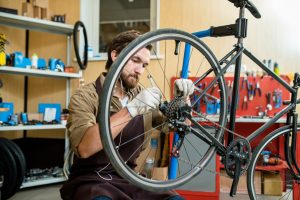HOW TO WORK AS A BICYCLE MECHANIC IN CANADA: THE COMPLETE GUIDE
Ever thought about becoming a bicycle mechanic? Do you get excited at the idea of working with tools, fine-tuning gears, and figuring out the inner workings of tiny components like pawl springs?
If you enjoy taking things apart just to rebuild them better, this might be the ideal path for you.
With more than four decades of experience, we’ll walk you through what it takes to become a skilled bicycle mechanic—who’s a great fit for the role (and who might not be), the ups and downs of working in the cycling world, and the one key to success that no classroom can teach.

What is a bicycle mechanic?
“Is being a bicycle mechanic considered a trade?”—it’s a question that frequently pops up on Google.
Some view it as a casual, part-time role or something students take on for a bit of hands-on experience.
Others mistakenly equate bicycle mechanics with bicycle assemblers. But there’s a clear difference—assemblers typically take new bikes out of boxes, attach the handlebars, front wheel, and saddle, and prepare them for sale. While they may refer to themselves as mechanics, the scope of their work is much more limited.
In this guide, when we refer to a bicycle mechanic, we’re talking about someone who handles the full spectrum of bike servicing and diagnostics—someone who dives deep into complex repairs and real problem-solving.

The confusion around this trade is partly due to the fact that, for many years, the Australian government didn’t officially recognize ‘bicycle mechanic’ as a legitimate profession. (We’ll get into that shortly.)
That said, being a bicycle mechanic is very much a real job—and a rewarding, hands-on one at that.
So, what does it take to become a bike mechanic?
The path isn’t always clear-cut.
But before diving into the details, let’s start with an easier question.
Why do you want to be a bike mechanic?
Passionate about cycling? Eager to learn how to fix your own bike?
That’s awesome—but it doesn’t necessarily mean you’re cut out to be a bicycle mechanic.
Whenever we’ve posted job openings for experienced workshop staff, we often receive applications from people who have never worked in a bike shop—let alone done any hands-on mechanical repairs. Most of them say two things:
a) how much they love cycling, and
b) that they’re looking for a “fun and laid-back” job.
Here’s the truth: being passionate about riding bikes is very different from choosing bike mechanics as a profession. Don’t get us wrong—we enjoy what we do, but it is work. It’s demanding, both mentally and physically. The bike industry can be tough, and earning a solid living in it isn’t always easy.
If you think the job is all about hanging out in a bike shop, testing cool gear, sipping espresso, and chatting with customers about the latest custom builds… well, that’s maybe 2% of the job.
The rest? It’s grease, grit, and constant problem-solving.
And most days, your coffee will be cold before you get a chance to drink it.
Still interested? Great—let’s dive deeper.
Are bike mechanics in demand?
Yes—there’s a rising global demand for skilled bicycle mechanics.
For starters, the COVID-19 pandemic sparked a huge cycling boom. With new bike sales soaring, shops quickly ran out of stock, leaving shelves bare. That meant many people had no choice but to dust off their old bikes and get them serviced instead of buying new ones.
On top of that, today’s economic pressures are pushing people to make more cost-effective choices—keeping their current bikes running smoothly rather than splurging on a replacement.
Then there’s the rise of electric bikes. E-bikes come with their own unique set of servicing needs, requiring mechanics with specialized training and knowledge.
Lastly, there’s growing awareness of the environmental cost of tossing bikes into landfill. More riders are now choosing to repair rather than replace.
In short: the world needs skilled, reliable bike mechanics more than ever.
What qualifications do I need to become a bicycle mechanic?
Here’s where it gets a little surprising.
A few years ago, the Victorian government made the decision to scrap the bicycle mechanic component from their apprenticeship programs. Why? Because they saw it as more of a hobby than a real career.
That label wasn’t just disheartening—it was downright disrespectful to the thousands of skilled bicycle mechanics working across Canada.
Victoria was also the last state to offer this kind of apprenticeship, so once it was removed, Australia was left with no official training pathway for aspiring bike mechanics.
So what does that mean today?
Technically, there’s no formal qualification required to become a bicycle mechanic in Canada.
At first glance, that might sound like a good thing—no barriers to entry! But in reality, it presents two major problems:
-
There’s no clear career path. Without structured training, it’s tough for someone new to know how or where to start if they’re serious about doing this professionally.
-
Quality control becomes a big issue. Anyone with a wrench can call themselves a mechanic. This flood of underqualified “bike fixers” lowers industry standards and damages trust. Imagine if dentistry worked the same way—no thanks!
As of January 2025, there’s still no nationally recognised apprenticeship for bike mechanics in Canada.
That said, there are a few course options out there, and completing one can help demonstrate to potential employers that you’re committed and serious about joining the trade.
Where can you learn to become a bike mechanic?
And when we say “a handful of options,” we’re not exaggerating.
In Canada, there are currently a few recognized ways to get started as a bicycle mechanic:
-
Certificate II in Bicycle Mechanical Technology (a beginner-level course)
-
Certificate III in Bicycle Workshop Operations (a more advanced qualification)
Where can you actually take these courses?
-
A few colleges in British Columbia and Ontario
-
Some privately operated training centres
-
And notably, the K2O School of Bicycle Mechanics – a specialized training provider dedicated to teaching bike mechanics through hands-on, real-world experience.
If you’re not located near one of these options, availability may still be limited.
The good news?
Many skilled bicycle mechanics across Canada have never taken a formal course. Instead, they’ve learned the trade on the job, through mentorship, and a genuine passion for fixing bikes.
So while programs like those offered at K2O School of Bicycle Mechanics can help you stand out, they’re just one of several paths into the profession.
That’s how to become a bicycle mechanic in Canada in 2025.
There are definitely some challenges in this line of work, but overall, it can be an incredibly satisfying and rewarding career.
If you love the inner workings of a bicycle, take pride in delivering great results, and genuinely care about your customers’ safety and enjoyment, you’ll be able to power through even the most frustrating days—and still show up the next morning with a renewed sense of purpose and excitement for what’s ahead.
After all, isn’t that what we all want out of life?
